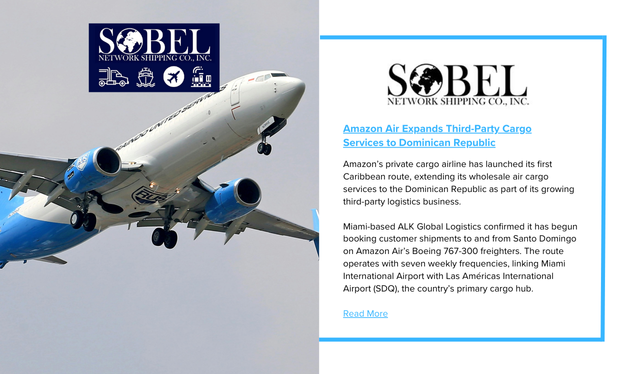Amazon’s private cargo airline has launched its first Caribbean route, extending its wholesale air cargo services to the Dominican Republic as part of its growing third-party logistics business.
Miami-based ALK Global Logistics confirmed it has begun booking customer shipments to and from Santo Domingo on Amazon Air’s Boeing 767-300 freighters. The route operates with seven weekly frequencies, linking Miami International Airport with Las Américas International Airport (SDQ), the country’s primary cargo hub.
The new service marks Amazon Air’s second international cargo lane since it began selling excess aircraft capacity to outside customers in September 2024. While Amazon primarily uses its fleet of roughly 100 converted freighters to support next-day and two-day deliveries for its retail marketplace, its wholesale division allows logistics providers and freight forwarders to move general cargo independently of Amazon’s retail network.
ALK becomes the fourth publicly named customer of Amazon Air Cargo, joining other logistics partners already using the airline’s network. The flights are operated by North Carolina-based contractor 21 Air. Aerodom, the operator of SDQ, is coordinating with ALK to maximize utilization of the new lane, which coincides with rising e-commerce volumes and the opening of a new parcel terminal at the airport capable of handling an additional 4 million packages per year.
The Dominican Republic expansion follows Amazon Air’s entry into the Colombian market earlier this year with daily flights between Miami and Bogotá, supported by Avianca Cargo. Amazon has also struck partnerships with international carriers including South Korea’s Air Premia and logistics giant Kuehne+Nagel, leveraging Honolulu as a transshipment hub for U.S. distribution.
The Caribbean launch highlights the broader shift of Amazon Air into wholesale cargo markets, a strategy increasingly positioning the airline as both an e-commerce enabler and a regional logistics competitor.


